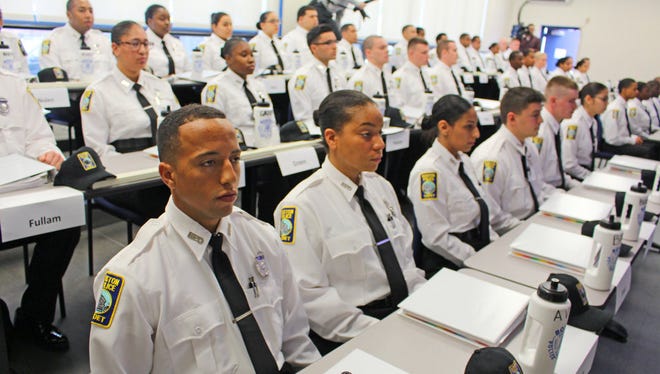Vet hiring preference hinders police diversity

Boston’s police commissioner has another problem with the vet-to-cop pipeline. In a city whose residents are more than half people of color, the Boston Police Department is two-thirds white. Like many big-city chiefs, William B. Evans is struggling to recruit African-Americans and Latinos to build greater trust with city neighborhoods they serve. But under the state’s strict preference, military veterans go to the head of the line. And Massachusetts veterans reflect the racial demographics of an overwhelmingly white state, not urban Boston. Almost nine out of 10 military veterans who live in Massachusetts are white.
Attracting non-white recruits is hard enough without the veterans’ preference, Evans notes.
“Obviously, it’s a tough job for a minority,” he says. “They are in a community that really doesn’t like them. And they think they are a sellout, you know, ‘Uncle Toms.’”
Seattle Police Chief Kathleen O’Toole, who was a predecessor of Evans in Boston, said the preference also makes it hard to change the culture of policing. While she can list many vets who have been “great cops,” she said, “I want to attract people with very different skill sets.We are facing complicated issues with people who are in crisis every day. Why wouldn’t I want people who majored in human services? Or psychology or sociology?”
The Marshall Project analysis of veteran preference laws found that all 50 states and the federal government have historically given an edge to military veterans in law enforcement hiring, promotion or job protection. The most common advantage is an extra five points on the entrance exam, or ten points for a disabled veteran.
Massachusetts and New Jersey have the most favorable laws for vets seeking police work. An honorably discharged veteran skips to the top of police hiring lists, which makes it more difficult to hire women and minorities.
In New Jersey, eight out of 10 veterans are white men. Only five percent of veterans who reach the stage of being screened for police work are women.
Until 2015, Jersey City, where only 32 percent of residents are white, went a decade with no black cops above the rank of sergeant. Jersey City has opened a new police recruitment office, headquartered in a bustling African-American neighborhood, which offers applicants free police test preparation classes and help finding work while they snake through the months-long hiring process.
“Correcting things that have been in place for decades is obviously not easy,” says Jersey City Mayor Steven Fulop. “The civil service process can make it difficult.”
In Boston, without veteran status, applicants need a near-perfect score on the police exam to land a spot in the Boston Police Academy. “It’s pointless,” says Jacobo Negron, President of the Massachusetts Latino Police Officers Association, about taking the Police Academy entrance exam. “Why take the test?”
In an attempt to circumvent the state’s pro-veteran hiring preferences, Evans has revised a once defunct police cadet trainee program and has ordered his recruiters to seek out young minority Bostonians. After a two-year period, these new cadets are eligible to become full-time cops.
“The whole idea of cadets is to basically counteract the absolute veterans preference, which seems to be all white,” Evans says. The first class of the 42 junior officers — only 25 percent white — were sworn in mid-November.
Outside of the city, about a half dozen localities in Massachusetts have opted out of the civil service system altogether. “You are seeing so many returning veterans,” says Terry Cunningham, who recently retired as police chief in Wellesley. Wellesley voted to take its police out of civil service in 2010. “For the most part they were white males. We weren’t getting any diversity in the department.”
More coverage:
Cop2Cop offers peer support to New Jersey's finest willing to come out from behind the shield